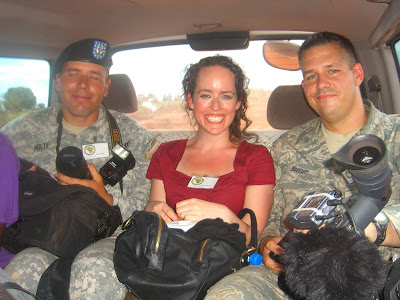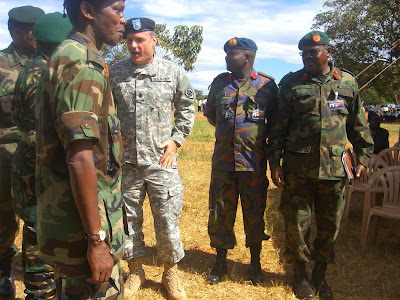 Girls on their way to church
Girls on their way to church  Baboons surrounded our car several times on the drive up and held out their hands for food
Baboons surrounded our car several times on the drive up and held out their hands for food School children we met during our drive
School children we met during our drive


Kitgum is home to the Acholi tribe. The Acholi people speak softly, almost in whispers, and some of the men have high-pitched, delicate voices. Throughout Uganda people are deferential and at times subservient, which makes me feel uncomfortable. A Ugandan army officer told me, "Most of my friends think whites are superior. We think you know how to do things better than we do. That's why people here run to help you and why they are eager to please."
Some people in Kitgum had never seen a white person before. One man asked if I was from India, and when I told people I was from the United States, everyone wanted to know my opinion of Obama. "He is our blood," they said. The most popular baby name in Uganda is Barack Obama, and pictures of him hung in shops throughout Kitgum. Tom Murphy, the cameraman I'm working with, filmed for two days in Botswana before I arrived, where he said children at a Botswana school were chanting "Yes we can! Yes we can!"
"Are you with them?" people in Kitgum asked me, referring to the 500 U.S. soldiers who had set up camp near their town. The U.S. army was here for one week as part of AFRICOM, a unified command center for army operations in Africa created by George W. Bush in 2007. Some Africa-watchers say AFRICOM is part of a U.S. response to China's rapidly growing investment and presence in Africa. In Uganda, China plans to finance two hydroelectric dams on the Nile in exchange for two oil exploration concessions.
As part of AFRICOM the U.S. military has begun intense, week long operations in countries throughout the continent. General William Ward, the head of AFRICOM, told me it's part of an effort "to improve stability and relations with the people."
 General Ward's arrival in Kitgum
General Ward's arrival in Kitgum
General Ward's description of AFRICOM reminded me of an interview I had with a Chinese executive in South Africa. The executive explained how China's economic investments contribute to longterm stability in Africa. "But of course," he added off camera, "China's not here for charity."

In the press van with Ugandan journalists
 In the press van with Army journalists
In the press van with Army journalistsAn Army Major told me AFRICOM's military operations were about "establishing an economic base."
"If we can help the local people while doing it, then that's good," he said. During this operation soldiers painted Kitgum high school and operated two-day medical clinics. Thousands of people waited in line for treatment.
 Thousands of people waited for treatment outside the U.S. Army run medical clinics
Thousands of people waited for treatment outside the U.S. Army run medical clinics

U.S. soldiers told me they were aware of the Chinese presence. One said, "Sometimes we're in the same town, and we hear that the Chinese are also running a hospital clinic in this town, and I've wondered why, if we're trying to help the people, why we're not partnering with them. But we're told not to involve the Chinese in our events. I think everyone's looking for a piece of the pie."
As part of the operation, the U.S. Army trained 600 soldiers from Uganda, Burundi, Kenya, Rwanda and Tanzania how to perform hand to hand combat and crowd control, all part of an effort to "improve relations" and "establish connections."






Soldiers also said they were "practicing initiatives": how to procure fuel and measure fuel purity for their helicopters, how to provide water for their troops and assessing how expensive a military operation in Kitgum would be. These were tests the soldiers said they had to do "in the event they needed to return for a real world situation, a crisis."
"What are you practicing for?" I asked an army public affairs officer. "What kind of conflict would bring the U.S. to northern Uganda? Conflict with China? With Al Qaeda?"
He responded, "Do you know what I hope? I hope that we build solar panels across the eastern United States. I hope that we become energy independent so that we can let China go into Africa, South America and the Middle East for oil. And China will have all the same problems we've had over the last few years. That's my hope."
The officer continued. "We got to the game [in Africa] late," he said, "I think the U.S. is becoming like the British Empire, and look at what happened to them. We're everywhere the British used to be. We wasted years fighting wars in Afghanistan and Iraq. You know the saying, 'the sun never sets on the British Empire?,' Now it sets at tea time."
I spent most of my time in Kitgum with Army Major Reggie Kornegay, who led the military operations' civil affairs outreach. Kornegay seemed to relish immersing himself in the local community, a job he's enjoyed in Iraq and Afghanistan, and now in Africa. He arrives before the other troops and builds connections with villagers so they do not fear the presence of the U.S. army. "You fight extremism and extreme ideologies through ideas and relations with the people," he told me.
 Major Kornegay on the right with a Ugandan soldier
Major Kornegay on the right with a Ugandan soldier Major Kornegay with former refugees of the rebellion in northern Uganda
Major Kornegay with former refugees of the rebellion in northern Uganda Until two years ago, the people of Kitgum were the victims of extreme ideology and a violent rebellion of extraordinary horror. Joseph Kony was born in a village called Gulu nearby. In 1986 he claimed to be the voice of God and began a violent campaign to overthrow the Ugandan government. Kony leads a guerilla group called the Lord's Resistance Army and says he wants to establish theocratic rule in Uganda based on the Christian Bible and the Ten Commandments.
Over the last 20 years Kony's army has abducted more than 30,000 children, forcing young boys to become child soldiers and young girls into sexual enslavement. To retaliate against children who escaped, Kony attacked their families, in one instance massacring 56 people in a village.
Major Kornegay took me to visit families who had recently returned home after years of living in IDP camps (Internally Displaced Person). I met with them outside of their straw-roofed, circular huts.

 With women who recently returned home from IDP camps
With women who recently returned home from IDP camps With Major Kornegay and a family who moved home earlier this year from an IDP camp
With Major Kornegay and a family who moved home earlier this year from an IDP camp One woman, Florence, pointed to where she buried six of her family members who died during the rebellion, including her husband. She told me how she and others escaped into the bush after Kony's soldiers came. When their babies began to cry during the escape, the women had to leave them behind on the ground.
Kony kidnapped the children of many of the women I met. Florence's nephew was abducted. Eventually he escaped and returned home, and she described the counseling the young boy had to go through before meeting his family again. "He was extremely violent," she said. "He would have killed us."
People like Florence throughout northern Uganda didn't want the army to fight Kony, because that would mean shooting the young boys that were abducted from their families, and Ugandan soldiers described to me the psychological challenge of firing on armed children.

Unable to defeat Kony's army, the government attempted to protect people by forcing them to live in IDP camps guarded by Ugandan soldiers. The women I met lived in camps for six years, where they said, "AIDS spread very, very quickly." They were allowed to return to their homes this year.
In 2007 Kony left Uganda and is believed to be in the Democratic Republic of the Congo. "We are afraid Kony will come back," the woman told me, "But we are so glad you are here. It means you care."
While Tom was filming I played with the women's children, who had spent most or all of their lives in IDP camps. I knew from their distended stomachs that they weren't getting enough to eat, but it wasn't until I left that I was told that some of the children would likely die of malnutrition. "They need food fast," Tom said.








We returned to the army camp where tents were being taken down and belongings packed away. Just a few days after it had begun, the U.S. military operation was over and helicopters were transporting soldiers south to Entebbe, after which many would return to the U.S. According to army rules, the soldiers could not leave behind medical equipment. They did leave enough medication to last one to two months.
The next day I left our small hotel for an early morning walk through town. I passed shacks and stores, and a church with a large sign on top of the roof that said, "Jesus is the lamb of God who takes away the pain of the world."
I walked through a fish market where I met two fish sellers named Consi and Margaret.
I told the women I was American. "Are you with them?" Consi asked. I explained I wasn't with the U.S. Army, but I was reporting a story on the army.
"Are you coming back? Are the soldiers coming back?" she asked.
"I would like to come back. I love Kitgum," I said. "I would like to return."
"When?"
"I don't know," I answered.
"We need you to come back. We need medicine. Half of our community has AIDS."
She said I should stay with her next time I am in Kitgum and that she would introduce me to her son and teach me how to make Acholi food for him. Consi and her friends then laughed as if that was the funniest idea in the world.
"Are you saved?" she asked just before I said goodbye. "Are you a Christian? I am saved. My friend Margaret is too."
 Margaret at the fish market
Margaret at the fish market

A couple of months ago, I saw your News Hour report on the Beijing petitioners. I've been looking for more of your reporting, ever since then. I'm glad to have found this blog. Stay safe.
ReplyDelete